Related Research Articles

Mong Kok is an area in Kowloon, Hong Kong. The Prince Edward road occupies the northern part of Mong Kok.
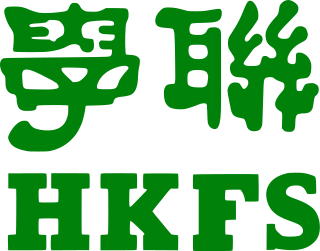
The Hong Kong Federation of Students is a student organisation founded in May 1958 by the student unions of four higher education institutions in Hong Kong. The inaugural committee had seven members representing the four schools. The purpose of the HKFS is to promote student movements and to enhance the student body's engagement in society. Since the 1990s, the federation has taken an interest in daily events in Hong Kong, and no longer restricts itself to the areas of education and politics. The HKFS council (代表會) is convened by representatives of the university student unions. The representatives are elected by the university students. A standing committee is appointed by the council.

Occupy Central with Love and Peace (OCLP) was a single-purpose Hong Kong civil disobedience campaign initiated by Reverend Chu Yiu-ming, Benny Tai and Chan Kin-man on 27 March 2013. The campaign was launched on 24 September 2014, partially leading to the 2014 Hong Kong protests. According to its manifesto, the campaign advocates for an electoral system in Hong Kong that is decided through a democratic process and satisfies international standards of universal and equal suffrage. With the first three stages of the movement – dialogue, deliberation and citizens' authorization – the civil disobedience that follows must be non-violent.
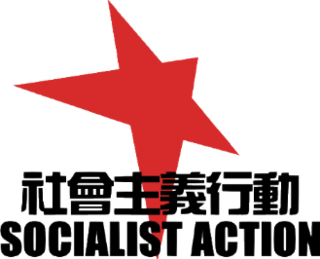
Socialist Action is a Trotskyist political organisation in Hong Kong. It is affiliated with International Socialist Alternative (ISA) and works closely with the ISA sections in China and Taiwan. It describes itself as being based on the method and analysis of Marxism, to politically re-arm and organise the working class in the fight for a socialist world. They oppose the Communist Party of China, which they claim has made China the 'Sweatshop of the World' with one of the most extreme wealth gaps on the planet. They stand for the creation of fighting independent trade unions by Chinese workers to fight against capitalist exploitation and authoritarian rule.

Joshua Wong Chi-fung is a Hong Kong activist and politician. He served as secretary-general of the pro-democracy party Demosistō until it disbanded following the implementation of the Hong Kong national security law on 30 June 2020. Wong was previously convenor and founder of the Hong Kong student activist group Scholarism. Wong first rose to international prominence during the 2014 Hong Kong protests, and his pivotal role in the Umbrella Movement resulted in his inclusion in TIME magazine's Most Influential Teens of 2014 and nomination for its 2014 Person of the Year; he was further called one of the "world's greatest leaders" by Fortune magazine in 2015, and nominated for the Nobel Peace Prize in 2017.

A series of sit-in street protests, often called the Umbrella Revolution and sometimes used interchangeably with Umbrella Movement, or Occupy Movement, occurred in Hong Kong from 26 September to 15 December 2014.
The Umbrella Movement was a political movement that emerged during the Hong Kong democracy protests of 2014. Its name arose from the use of umbrellas as a tool for passive resistance to the Hong Kong Police's use of pepper spray to disperse the crowd during a 79-day occupation of the city demanding more transparent elections, which was sparked by the decision of the Standing Committee of the National People's Congress of the People's Republic of China (NPCSC) of 31 August 2014 that prescribed a selective pre-screening of candidates for the 2017 election of Hong Kong's chief executive.

Lester Shum is a Hong Kong social activist and politician. He was a leader of the 2014 pro-democracy protests in Hong Kong and served as deputy secretary-general of the Hong Kong Federation of Students (HKFS) from April 2014 to March 2015. He is a member of the Tsuen Wan District Council for Hoi Bun since 2019.
The Umbrella Ultra Marathon, or Umbrellaultra, was a 102 km distance running event held on 29 October 2014. It was not a competitive race, but a running event to support the Umbrella Movement of Hong Kong. The course covered New Territories, Kowloon and Hong Kong Island, which shows an umbrella shape on the map. Thus the trail is also known as the Umbrella Trail.
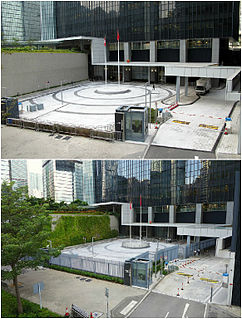
The East Wing Forecourt of the Central Government Office, or Civic Square, is an open space in front of the East Wing of the Central Government Complex, Hong Kong, which is located in Tamar. It was once an area where protesters took part in protests and demonstrations. It was closed in July 2014, and reopened on 10 September 2014. For many, it represents democracy and freedom, and a place to express their discontent. It was occupied for a rally opposing the moral and national education school curriculum proposal in August 2012, and during the 2014 Hong Kong protests in September 2014. Since then, the square is closed by the government in order to prevent protests.
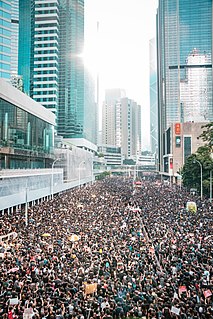
Relations between people in Hong Kong and mainland China have been relatively tense since the early 2000s. Various factors have contributed, including different interpretations of the "one country, two systems" principle; policies of the Hong Kong and central governments to encourage mainland visitors to Hong Kong; and the changing economic environment. More broadly, there exists resentment toward mainland-Hong Kong convergence or assimilation, and toward perceived interference from mainland China in Hong Kong's internal affairs.
Art of the Umbrella movement refers to artistic works created as part of the Umbrella movement in Hong Kong which demanded democracy in the election of the territory's top leader. Most of the physical works of art are located within the three main protest sites of Admiralty, Causeway Bay and Mong Kok, some concepts have originated from outside Hong Kong.

Lennon Wall, in the Hong Kong context, originally referred to the mosaic wall created during the Umbrella Movement, located at Central Government Complex, Harcourt Road, Admiralty. The wall is one of the major artworks of the Umbrella Movement as a collective artistic work of spontaneous free expression, demanding democracy in the elections of the territory's top leaders.

Alvin Cheng Kam-mun, also known as "Brother Four Eyes", is a Hong Kong political activist, a member of Civic Passion, and founder of student activist organization Student Front. In 2014, he led a rally in support of the Hong Kong Umbrella Movement during the G20 Brisbane summit.

Hong Kong Indigenous is a localist political group established in 2015. It is known for its localist stances and militant tendency of protesting. It has been actively involved in protests and engaged into violent clashes with police, including in the anti-parallel trading protests and the Mong Kok unrest. Ray Wong Toi-yeung is the former convenor and key figure of the group.

Civil unrest occurred in Mong Kok, Hong Kong from the night of 8 February 2016 until the following morning. The incident escalated from the government's crackdown on unlicensed street hawkers during the Chinese New Year holidays. Eventual violent clashes broke out between police and protesters, resulting in injuries on both sides.

In Hong Kong, localism is a political movement centered on the preservation of the city's autonomy and local culture. The Hong Kong localist movement encompasses a variety of groups with different goals, but all of them oppose the perceived growing encroachment of the Chinese central government on the city's management of its own political, economic, and social affairs. Issues of concern to localist groups include land use and development, cultural and heritage conservation on the left, parallel trading and the increasing number of mainland immigrants and tourists on the right. On the autonomy of Hong Kong, many of them advocate the Hong Kong people's right to self-determination, while milder elements advocate for greater autonomy while remaining part of China, and the most radical call for return to British rule or full independence as a sovereign state. Certain right-wing localist groups also advocate for a more aggressive and militant approach in defending popular interests.
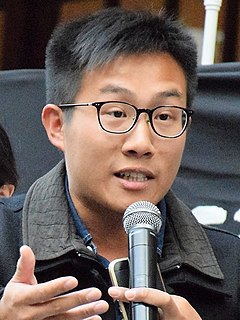
Raphael Wong Ho-ming is a Hong Kong social activist and politician. He is currently the chairman of the League of Social Democrats (LSD) and was one of the leaders in the 2014 Hong Kong protests.
The 2010 Hong Kong democracy protests reflected the growing force of the pro-democracy movement in the region, and were sparked by events that year including electoral reforms and the arrest of a high-profile Chinese activist, Liu Xiaobo. The democracy movements of 2010 can be seen as a precursor to the events of the 2014 Umbrella Revolution.
References
- ↑ I-Cable 有參加遊行人士不清楚遊行目的. (17 October 2014). Retrieved 16 March 2015.
- ↑ Hongwrong.com. Hongwrong.com. Umbrella Movement Lives on with the Rise of The "Shopping Revolution". (17 December 2014). Retrieved 16 March 2015
- ↑ "Anti-Mainland Sentiment on the Rise in Hong Kong". The Diplomat. Retrieved 29 September 2016.
- ↑ The Standard Archived 10 May 2015 at the Wayback Machine Locals battle anti-mainland protesters. (2 March 2015). Retrieved 16 March 2015
- ↑ "Yahoo Hong Kong Top Buzz 2014 – Local and International News". Yahoo! Hong Kong Limited. Retrieved 29 September 2016.
- ↑ "《日日去鳩嗚》華仔落場版MV" . Retrieved 29 September 2016– via YouTube.
- ↑ "Individual Visit Scheme – Time to stop?". HK Law Blog. Retrieved 29 September 2016.
- ↑ The Straits Times Triumphant Chinese media declares Hong Kong pro-democracy 'revolution' defeated. (12 December 2014). Retrieved 16 March 2015
- ↑ Yahoo! News Hong Kong Archived 2 April 2015 at the Wayback Machine 「光復」一個月 沙田商場人流減. (16 March 2015). Retrieved 16 March 2015